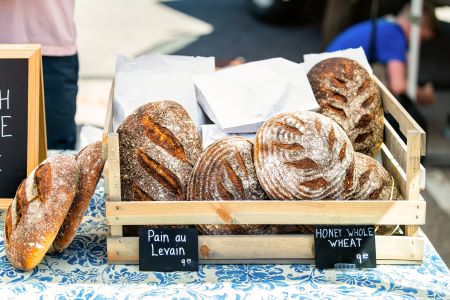Requirements for Selling

Learn more about the requirements for selling different types of homemade food in Alaska.
Local jurisdictions, including cities and military installations, may have addtional requirements.
- Questions about homemade food?
- Send us an email at dec.fss.homemade.food@alaska.gov.
On This Page
About Homemade Food
Homemade food is a category of food products that are produced in homes or leased kitchens and can be sold in Alaska without permitting or inspection. These types of food products are sometimes called "cottage food."
There are specific types of food that can be sold as homemade food in Alaska. The homemade food rule describes the types of food products that are allowed, the methods for selling those products, and the locations where they can be sold.
The sale methods and locations depend on whether the food is potentially hazardous or non-potentially hazardous. Determining Non-Potentially Hazardous Food has more information for producers who are uncertain about the type of food they are selling.
Selling Potentially Hazardous Food

Potentially hazardous food products only last for a certain amount of time or must be held at a certain temperature to ensure they are safe to eat. These foods are sometimes called time/temperature control for safety (TCS) foods.
In Alaska, certain types of potentially hazardous food may be sold as homemade food. These foods must always be sold by the producer directly to the consumer.
The sale of shell eggs as homemade food is different than other potentially hazardous food. Please visit Selling Eggs for more information.
Requirements
Eligible Foods: See Potentially Hazardous Food; if selling shell eggs, please refer to Selling Eggs
Methods of Sale: Producer sells the food directly to the consumer
Methods of Sale Not Allowed: Any person who is not the homemade food producer cannot sell potentially hazardous homemade food; wholesale, resale, and consignment are not allowed for homemade food
Locations: The producer's retail location; additional requirements apply if the producer's retail location is a permitted food establishment, see Direct to Consumer at a Permitted Facility
Display: Homemade food cannot be displayed or offered for sale on the same shelf or display as inspected food
Signage: A sign must be prominently displayed to inform consumers that the food was made in a home kitchen, may contain allergens, and is not, except for meat and meat products, regulated or inspected
Packaging: No requirements, may be packaged or unpackaged
Food Packaged for Individual Sale: Food products must have a clear and prominent label that includes
- The producer's name, current address, telephone number, and business license number; and
- The statement, "This food was made in a home kitchen, is not regulated or inspected, except for meat and meat products, and may contain allergens."
Unpackaged Food: Producers must inform the consumer by
- Stating that the unpackaged homemade food was prepared in accordance with AS 17.20.332 - 17.20.338 and is not subject to certain state certification, labeling, licensing, packaging, regulation, or inspection requirements; and
- Providing the producer's name, current address, telephone number, and business license number
Online Sales Allowed: Yes
Can Be Sold in Another State: No
Limit on Volume of Food Produced: No limit
Limit on Sales: No limit
Business License: Yes, with some exceptions; check with Business Licensing to confirm
Can Be Used As an Ingredient at a Permitted Food Establishment: No
Selling Non-Potentially Hazardous Food

Non-potentially hazardous foods do not require time or temperature control to be safe for people to eat. Examples of non-potentially hazardous foods include sourdough bread, fudge, and vinegar.
In Alaska, non-potentially hazardous food may be sold as homemade food. These foods may be sold by the homemade food producer or an agent of the producer.
Requirements
Eligible Foods: See Non-Potentially Hazardous Food
Methods of Sale: Producer sells the food to the consumer or an agent of the producer sells the food to the consumer; additional requirements apply to agents of the producer, see Sales by an Agent of the Producer
Methods of Sale Not Allowed: Wholesale, resale, and consignment are not allowed for homemade food (agents of a producer selling on behalf of the producer are not considered to be wholesaling, resaling, or consigning products under the homemade food rule)
Locations: The producer's retail location or the agent's retail location
Display: Homemade food cannot be displayed or offered for sale on the same shelf or display as inspected food
Signage: A sign must be prominently displayed to inform consumers that the food was made in a home kitchen, may contain allergens, and is not, except for meat and meat products, regulated or inspected
Packaging: No requirements, may be packaged or unpackaged
Food Packaged for Individual Sale: Food products must have a clear and prominent label that includes
- The producer's name, current address, telephone number, and business license number; and
- The statement, "This food was made in a home kitchen, is not regulated or inspected, except for meat and meat products, and may contain allergens."
Unpackaged Food: Producers or agents of a producer must inform the consumer by
- Stating that the unpackaged homemade food was prepared in accordance with AS 17.20.332 - 17.20.338 and is not subject to certain state certification, labeling, licensing, packaging, regulation, or inspection requirements; and
- Providing the producer's name, current address, telephone number, and business license number
Online Sales Allowed: Yes
Can Be Sold in Another State: No
Limit on Volume of Food Produced: No limit
Limit on Sales: No limit
Business License: Yes, with some exceptions; check with Business Licensing to confirm
Can Be Used As an Ingredient at a Permitted Food Establishment: No
Direct to Consumer at a Permitted Facility
Producers selling potentially hazardous homemade food must sell that food directly to the consumer. Another person cannot sell potentially hazardous homemade food for the producer.
If a producer's retail location is a permitted food establishment that also sells inspected food, there are additional requirements that must be met when selling potentially hazardous homemade food.
Requirements
- All requirements listed in Selling Potentially Hazardous Food, including labeling and signage
- Physical separation of uninspected food and inspected food during storage, display, and sale
- A separate door and cash register or point of sale for homemade food (uninspected) and inspected food
- Separate coolers, freezers, warehouses, or other storage areas to keep homemade food and inspected food from intermingling
- Signs or other markings to indicate the locations of uninspected food and inspected food
- Clearly identify where homemade, uninspected food is located in the permitted establishment
- Clearly identify where inspected food is located in the permitted establishment
Sales by an Agent of the Producer
An agent of the homemade food producer may sell non-potentially hazardous homemade food on behalf of the producer. Homemade food is not otherwise eligible for wholesale, resale, or consignment.
Requirements
- All requirements listed in Selling Non-Potentially Hazardous Food, including labeling and signage
- The agent is eligible to sell homemade food on behalf of the producer
- Agents of the producer may be individuals or retail locations, including gift shops, convenience stores, grocery stores, coffee shops, restaurants, food hubs, and other similar locations
- The agent only sells non-potentially hazardous homemade food
- Agents of homemade food producers may not sell potentially hazardous homemade food on behalf of producers
Highly Recommended
- An agreement between the homemade food producer and the agent of the producer that has been signed by both parties
- The agreement describes the relationship between the producer and their agent and demonstrates that the two parties are operating under the homemade food rule and are not wholesaling, resaling, or consigning products; note that wholesaling food is under FDA and USDA jurisdiction
Local Requirements
Cities, boroughs, military installations, and other local jurisdictions in Alaska may have additional requirements for selling homemade food in their communities. This includes the Municipality of Anchorage. Be sure to check local requirements prior to selling homemade food.
Statutory Reference
- AS 17.20.332 Exemption for Homemade Food
Resources and Contacts
Resources
- Types of Food
- Information about the types of food that can be sold under Alaska's homemade food rule
- Determining Non-Potentially Hazardous Foods
- Information about using pH and water activity (aw) to determine if a food is non-potentially hazardous
- Guide to Operating a Successful Home-Based Food Business
- A publication of the Cooperative Extension Service in partnership with the Department of Environmental Conservation
- National Center for Home Food Preservation
- Recipes, guidance, and other resources for preserving and processing food at home with a focus on food quality and safety
- Selling Eggs
- Information about safely selling eggs in Alaska
- Mail Order Food Safety
- Recommendations from the USDA for sending food safely in the mail
- Made in Alaska
- Information from the Department of Commerce, Community, and Economic Development about the Made in Alaska program
- Non-Timber Forest Product Commercial Harvest Permit
- Information from the Department of Natural Resources about obtaining a limited non-timber forest product commercial harvest permit
Contacts
- Food Safety and Sanitation
- Send us an email at dec.fss.homemade.food@alaska.gov
- Cooperative Extension
-
- 308 Tanana Loop, Room 101
- P.O. Box 756180
- Fairbanks, Alaska 99775
- 907-474-5211
- ces@alaska.edu
- Environmental Health Laboratory
-
- 5251 Dr. Martin Luther King, Jr. Avenue
- Anchorage, Alaska 99507
- 907-375-8200
- DEC.EH-Lab-ShippingReceiving@alaska.gov

 Indicates an external site.
Indicates an external site.